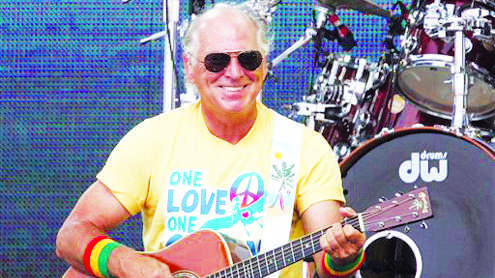 A sign in Gulf Shores last weekend read “What would Jimmy Buffett do? Throw a party at the oil slick.”
A sign in Gulf Shores last weekend read “What would Jimmy Buffett do? Throw a party at the oil slick.”
Since the oil spill in the Gulf of Mexico first absorbed the nation’s attention two months ago, a sense of hopelessness has permeated through the media, local businesses and the population at large. Outside of stopping the gusher, we have accepted the proposition that there just isn’t much anyone can do to help the Gulf Coast.
There was something that Jimmy Buffett could do. Sunday, he drew 35,000 of his dedicated Parrotheads to the sands of Gulf Shores for a remarkable concert. Thousands of others watched the event on live TV at various bars and restaurants along the beach.
These visitors spent money at local establishments, rented condos, and, at least temporarily, rejuvenated the oil-slickened tourism economy. It was, perhaps, the most successful economic stimulus plan we have seen yet.
It was also the best weekend Gulf Shores has seen in my lifetime. From the flow of oil, there came a fun-filled, historical event. Everyone there was truly happy, excited not only to experience the concert, but to also take part in the recovery of the Gulf Coast.
Two days before a hotly contested gubernatorial runoff, no one was thinking about politics or the economy. The focus was instead on Landshark beer, Cheeseburgers in Paradise, and Jimmy Buffett’s good music.
The most interesting aspect of the entire ordeal was perhaps the oil slick itself. It was nowhere to be seen. There were no oil stains along the pristine white sands and there was no sheen in the water. On live TV, broadcasted nation wide, millions of people saw that our beaches are clean.
This is attributable to the many relief workers who have spent their summer toiling along the beach, scooping up oil, laying boom and operating skimmers. These workers, too, have made a great contribution to reviving the area.
Experts tell us that the consequences of the oil spill will be long lasting, that it will take years for the environment to recover. It likely will. Concertgoers this weekend, though, weren’t thinking about the long-term. They were thinking about the here-and-now. They were thinking what people are slowly beginning to acknowledge: our coast is more resilient than many expect.
After Hurricane Fredrick hit in 1979 and devastated much of the shoreline, Gulf Shores and Orange Beach boomed, giving rise to many of the first large condominium developments. After Hurricane Ivan hit in 2004, a similar wave of reconstruction led to the completion of The Wharf, new, glossy high-rise condos, the Hangout, and countless stores and restaurants.
This challenge is undoubtedly different than the hurricanes. The spirit of Gulf Coast residents, however, is the same. The same work ethic and dedication that has led residents to build and grow Alabama’s shoreline into a major tourist attraction is now propelling them to fight the oil that lingers off our shore.
This work has been undertaken for one simple reason: people love our beaches. For locals like myself, growing up near the beach has provided a lot of good memories and great fun. Others, who come from all around the country and even the world, find the beach a great place to vacation and relax. All quickly fall in love with our sparkling white sand and the beautiful Gulf.
These affections, that have endeared people to the coast for decades, will not easily be broken. Similar dynamics exist throughout the oil-affected areas, all the way down the Florida panhandle to Destin and Panama City Beach. The Gulf Coast spirit endures.
That spirit will continue to propel this region forward as we undertake the work necessary to restore our way of life from this environmental calamity.
One day in the not-too-distant future, we will visit a coast that is more vibrant than it was before the oil spill. We will be in debt to the workers who have contained the tragedy, to the tourists who have remained loyal to the area, and to the locals who have supported the recovery. Perhaps, most of all, we will be in debt to Jimmy Buffett, who showed us there is something we can do: throw a party, have fun, be optimistic.
As a result, the Gulf Coast recovery has already started.
Tray Smith is the opinions editor of the Crimson White.









